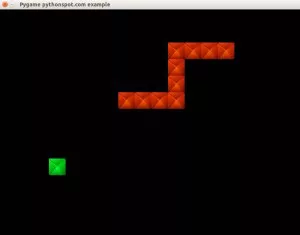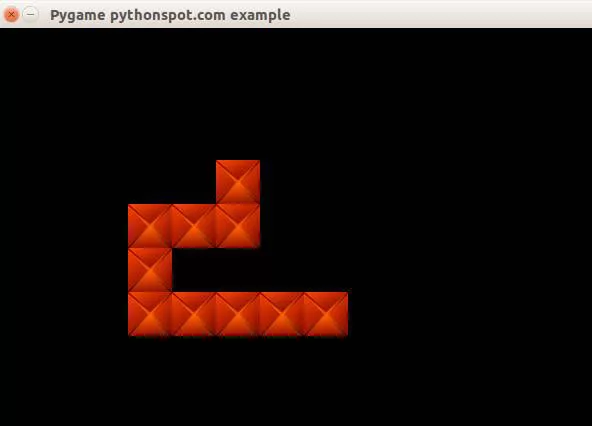Pygame 创建贪吃蛇游戏

在本教程中,你将学习如何构建游戏贪吃蛇。游戏是街机游戏,它具有非常简单的逻辑,这就是为什么它是演示如何使用 Pygame 构建游戏的理想示例。
玩家被表示为蛇,如果它吃苹果就会长大。游戏的目标是尽可能多地吃掉苹果,而不能碰到自己。这在游戏的早期阶段非常容易,但随着蛇的长度增长而变得越来越困难。
入门:基本结构和事件处理
我们定义了一个类 Player,它保持玩家在屏幕上的位置以及它移动的速度。此外,我们定义了 Player 实例可以执行的操作(移动):
class Player:
x = 10
y = 10
speed = 1
def moveRight(self):
self.x = self.x + self.speed
def moveLeft(self):
self.x = self.x - self.speed
def moveUp(self):
self.y = self.y - self.speed
def moveDown(self):
self.y = self.y + self.speed
可以创建玩家对象,并可以使用移动方法修改变量。
我们将这些方法与事件联系起来。在 Pygame 中,我们可以使用以下代码获得非阻塞键盘输入:
pygame.event.pump()
keys = pygame.key.get_pressed()
if (keys[K_RIGHT]):
print "Right arrow pressed."
完整的代码使我们能够在屏幕上移动 Player:
from pygame.locals import *
import pygame
class Player:
x = 10
y = 10
speed = 1
def moveRight(self):
self.x = self.x + self.speed
def moveLeft(self):
self.x = self.x - self.speed
def moveUp(self):
self.y = self.y - self.speed
def moveDown(self):
self.y = self.y + self.speed
class App:
windowWidth = 800
windowHeight = 600
player = 0
def __init__(self):
self._running = True
self._display_surf = None
self._image_surf = None
self.player = Player()
def on_init(self):
pygame.init()
self._display_surf = pygame.display.set_mode((self.windowWidth,self.windowHeight), pygame.HWSURFACE)
pygame.display.set_caption('Pygame pythonspot.com example')
self._running = True
self._image_surf = pygame.image.load("pygame.png").convert()
def on_event(self, event):
if event.type == QUIT:
self._running = False
def on_loop(self):
pass
def on_render(self):
self._display_surf.fill((0,0,0))
self._display_surf.blit(self._image_surf,(self.player.x,self.player.y))
pygame.display.flip()
def on_cleanup(self):
pygame.quit()
def on_execute(self):
if self.on_init() == False:
self._running = False
while( self._running ):
pygame.event.pump()
keys = pygame.key.get_pressed()
if (keys[K_RIGHT]):
self.player.moveRight()
if (keys[K_LEFT]):
self.player.moveLeft()
if (keys[K_UP]):
self.player.moveUp()
if (keys[K_DOWN]):
self.player.moveDown()
if (keys[K_ESCAPE]):
self._running = False
self.on_loop()
self.on_render()
self.on_cleanup()
if __name__ == "__main__" :
theApp = App()
theApp.on_execute()
你现在可以使用箭头键在屏幕上移动块。

创建 Player(蛇)
Player 控制具有初始长度的蛇。当按下箭头键时,这条蛇总是在移动并改变它移动的方向。为此,请更新 Player 类:
class Player:
x = 0
y = 0
speed = 32
direction = 0
def update(self):
if self.direction == 0:
self.x = self.x + self.speed
if self.direction == 1:
self.x = self.x - self.speed
if self.direction == 2:
self.y = self.y - self.speed
if self.direction == 3:
self.y = self.y + self.speed
def moveRight(self):
self.direction = 0
def moveLeft(self):
self.direction = 1
def moveUp(self):
self.direction = 2
def moveDown(self):
self.direction = 3
并且不要忘记在游戏循环中添加延迟。
import time
time.sleep (100.0 / 1000.0);
这开始更像是一条蛇,但它还没有基本长度。我们跟踪蛇的旧位置并移动蛇的头部。我们还将绘图方法移到了蛇身上。复制代码,你将有一条可以移动的蛇:
from pygame.locals import *
import pygame
import time
class Player:
x = []
y = []
step = 44
direction = 0
length = 3
updateCountMax = 2
updateCount = 0
def __init__(self, length):
self.length = length
for i in range(0,length):
self.x.append(0)
self.y.append(0)
def update(self):
self.updateCount = self.updateCount + 1
if self.updateCount > self.updateCountMax:
# update previous positions
for i in range(self.length-1,0,-1):
print "self.x[" + str(i) + "] = self.x[" + str(i-1) + "]"
self.x[i] = self.x[i-1]
self.y[i] = self.y[i-1]
# update position of head of snake
if self.direction == 0:
self.x[0] = self.x[0] + self.step
if self.direction == 1:
self.x[0] = self.x[0] - self.step
if self.direction == 2:
self.y[0] = self.y[0] - self.step
if self.direction == 3:
self.y[0] = self.y[0] + self.step
self.updateCount = 0
def moveRight(self):
self.direction = 0
def moveLeft(self):
self.direction = 1
def moveUp(self):
self.direction = 2
def moveDown(self):
self.direction = 3
def draw(self, surface, image):
for i in range(0,self.length):
surface.blit(image,(self.x[i],self.y[i]))
class App:
windowWidth = 800
windowHeight = 600
player = 0
def __init__(self):
self._running = True
self._display_surf = None
self._image_surf = None
self.player = Player(10)
def on_init(self):
pygame.init()
self._display_surf = pygame.display.set_mode((self.windowWidth,self.windowHeight), pygame.HWSURFACE)
pygame.display.set_caption('Pygame pythonspot.com example')
self._running = True
self._image_surf = pygame.image.load("pygame.png").convert()
def on_event(self, event):
if event.type == QUIT:
self._running = False
def on_loop(self):
self.player.update()
pass
def on_render(self):
self._display_surf.fill((0,0,0))
self.player.draw(self._display_surf, self._image_surf)
pygame.display.flip()
def on_cleanup(self):
pygame.quit()
def on_execute(self):
if self.on_init() == False:
self._running = False
while( self._running ):
pygame.event.pump()
keys = pygame.key.get_pressed()
if (keys[K_RIGHT]):
self.player.moveRight()
if (keys[K_LEFT]):
self.player.moveLeft()
if (keys[K_UP]):
self.player.moveUp()
if (keys[K_DOWN]):
self.player.moveDown()
if (keys[K_ESCAPE]):
self._running = False
self.on_loop()
self.on_render()
time.sleep (50.0 / 1000.0);
self.on_cleanup()
if __name__ == "__main__" :
theApp = App()
theApp.on_execute()
结果:

贪吃蛇游戏逻辑
蛇游戏有一些规则:
- 如果蛇吃了一个苹果,苹果就会移动到一个新的位置。
- 如果蛇吃了一个苹果,蛇的长度就会增长。
- 如果一条蛇与自身相碰,游戏结束。
我们首先创建一个新类,使我们能够创建苹果:
class Apple:
x = 0
y = 0
step = 44
def __init__(self,x,y):
self.x = x * self.step
self.y = y * self.step
def draw(self, surface, image):
surface.blit(image,(self.x, self.y))
为简单起见,我们将苹果显示为绿色立方体。我们有这个基本代码,但它比 Player 类要简单些:
from pygame.locals import *
import pygame
import time
class Apple:
x = 0
y = 0
step = 44
def __init__(self,x,y):
self.x = x * self.step
self.y = y * self.step
def draw(self, surface, image):
surface.blit(image,(self.x, self.y))
class Player:
x = []
y = []
step = 44
direction = 0
length = 3
updateCountMax = 2
updateCount = 0
def __init__(self, length):
self.length = length
for i in range(0,length):
self.x.append(0)
self.y.append(0)
def update(self):
self.updateCount = self.updateCount + 1
if self.updateCount > self.updateCountMax:
# update previous positions
for i in range(self.length-1,0,-1):
print "self.x[" + str(i) + "] = self.x[" + str(i-1) + "]"
self.x[i] = self.x[i-1]
self.y[i] = self.y[i-1]
# update position of head of snake
if self.direction == 0:
self.x[0] = self.x[0] + self.step
if self.direction == 1:
self.x[0] = self.x[0] - self.step
if self.direction == 2:
self.y[0] = self.y[0] - self.step
if self.direction == 3:
self.y[0] = self.y[0] + self.step
self.updateCount = 0
def moveRight(self):
self.direction = 0
def moveLeft(self):
self.direction = 1
def moveUp(self):
self.direction = 2
def moveDown(self):
self.direction = 3
def draw(self, surface, image):
for i in range(0,self.length):
surface.blit(image,(self.x[i],self.y[i]))
class App:
windowWidth = 800
windowHeight = 600
player = 0
apple = 0
def __init__(self):
self._running = True
self._display_surf = None
self._image_surf = None
self._apple_surf = None
self.player = Player(10)
self.apple = Apple(5,5)
def on_init(self):
pygame.init()
self._display_surf = pygame.display.set_mode((self.windowWidth,self.windowHeight), pygame.HWSURFACE)
pygame.display.set_caption('Pygame pythonspot.com example')
self._running = True
self._image_surf = pygame.image.load("pygame.png").convert()
self._apple_surf = pygame.image.load("apple.png").convert()
def on_event(self, event):
if event.type == QUIT:
self._running = False
def on_loop(self):
self.player.update()
pass
def on_render(self):
self._display_surf.fill((0,0,0))
self.player.draw(self._display_surf, self._image_surf)
self.apple.draw(self._display_surf, self._apple_surf)
pygame.display.flip()
def on_cleanup(self):
pygame.quit()
def on_execute(self):
if self.on_init() == False:
self._running = False
while( self._running ):
pygame.event.pump()
keys = pygame.key.get_pressed()
if (keys[K_RIGHT]):
self.player.moveRight()
if (keys[K_LEFT]):
self.player.moveLeft()
if (keys[K_UP]):
self.player.moveUp()
if (keys[K_DOWN]):
self.player.moveDown()
if (keys[K_ESCAPE]):
self._running = False
self.on_loop()
self.on_render()
time.sleep (50.0 / 1000.0);
self.on_cleanup()
if __name__ == "__main__" :
theApp = App()
theApp.on_execute()
现在我们添加了游戏逻辑。要知道蛇的位置是否与苹果位置匹配,我们必须进行碰撞检测。这简单地意味着蛇的坐标与苹果的坐标相交。我们创建了一个新方法:
def isCollision(self,x1,y1,x2,y2,bsize):
if x1 >= x2 and x1 <= x2 + bsize:
if y1 >= y2 and y1 <= y2 + bsize:
return True
return False
如果坐标 (x1,y1) 与其 (x2,y2) 在给定块尺寸 bsize 内相交的话,它将返回 True。我们称这种方法来确定蛇是否与苹果碰撞。我们需要为整条蛇检查这个,而不仅仅是头部,因为我们不希望苹果的新位置在蛇的某个地方。我们使用相同的 isCollision 方法来确定蛇是否与自身发生碰撞(=输掉游戏)。
完整代码:
from pygame.locals import *
from random import randint
import pygame
import time
class Apple:
x = 0
y = 0
step = 44
def __init__(self,x,y):
self.x = x * self.step
self.y = y * self.step
def draw(self, surface, image):
surface.blit(image,(self.x, self.y))
class Player:
x = [0]
y = [0]
step = 44
direction = 0
length = 3
updateCountMax = 2
updateCount = 0
def __init__(self, length):
self.length = length
for i in range(0,2000):
self.x.append(-100)
self.y.append(-100)
# initial positions, no collision.
self.x[1] = 1*44
self.x[2] = 2*44
def update(self):
self.updateCount = self.updateCount + 1
if self.updateCount > self.updateCountMax:
# update previous positions
for i in range(self.length-1,0,-1):
self.x[i] = self.x[i-1]
self.y[i] = self.y[i-1]
# update position of head of snake
if self.direction == 0:
self.x[0] = self.x[0] + self.step
if self.direction == 1:
self.x[0] = self.x[0] - self.step
if self.direction == 2:
self.y[0] = self.y[0] - self.step
if self.direction == 3:
self.y[0] = self.y[0] + self.step
self.updateCount = 0
def moveRight(self):
self.direction = 0
def moveLeft(self):
self.direction = 1
def moveUp(self):
self.direction = 2
def moveDown(self):
self.direction = 3
def draw(self, surface, image):
for i in range(0,self.length):
surface.blit(image,(self.x[i],self.y[i]))
class Game:
def isCollision(self,x1,y1,x2,y2,bsize):
if x1 >= x2 and x1 <= x2 + bsize:
if y1 >= y2 and y1 <= y2 + bsize:
return True
return False
class App:
windowWidth = 800
windowHeight = 600
player = 0
apple = 0
def __init__(self):
self._running = True
self._display_surf = None
self._image_surf = None
self._apple_surf = None
self.game = Game()
self.player = Player(3)
self.apple = Apple(5,5)
def on_init(self):
pygame.init()
self._display_surf = pygame.display.set_mode((self.windowWidth,self.windowHeight), pygame.HWSURFACE)
pygame.display.set_caption('Pygame pythonspot.com example')
self._running = True
self._image_surf = pygame.image.load("block.jpg").convert()
self._apple_surf = pygame.image.load("block.jpg").convert()
def on_event(self, event):
if event.type == QUIT:
self._running = False
def on_loop(self):
self.player.update()
# does snake eat apple?
for i in range(0,self.player.length):
if self.game.isCollision(self.apple.x,self.apple.y,self.player.x[i], self.player.y[i],44):
self.apple.x = randint(2,9) * 44
self.apple.y = randint(2,9) * 44
self.player.length = self.player.length + 1
# does snake collide with itself?
for i in range(2,self.player.length):
if self.game.isCollision(self.player.x[0],self.player.y[0],self.player.x[i], self.player.y[i],40):
print("You lose! Collision: ")
print("x[0] (" + str(self.player.x[0]) + "," + str(self.player.y[0]) + ")")
print("x[" + str(i) + "] (" + str(self.player.x[i]) + "," + str(self.player.y[i]) + ")")
exit(0)
pass
def on_render(self):
self._display_surf.fill((0,0,0))
self.player.draw(self._display_surf, self._image_surf)
self.apple.draw(self._display_surf, self._apple_surf)
pygame.display.flip()
def on_cleanup(self):
pygame.quit()
def on_execute(self):
if self.on_init() == False:
self._running = False
while( self._running ):
pygame.event.pump()
keys = pygame.key.get_pressed()
if (keys[K_RIGHT]):
self.player.moveRight()
if (keys[K_LEFT]):
self.player.moveLeft()
if (keys[K_UP]):
self.player.moveUp()
if (keys[K_DOWN]):
self.player.moveDown()
if (keys[K_ESCAPE]):
self._running = False
self.on_loop()
self.on_render()
time.sleep (50.0 / 1000.0);
self.on_cleanup()
if __name__ == "__main__" :
theApp = App()
theApp.on_execute()
结论:
你学习了如何使用 Python 创建游戏蛇以及碰撞检测,图像加载和事件处理等概念。很多东西都可以添加到这个小玩具游戏中,但这只是一个非常简单的例子。🙂